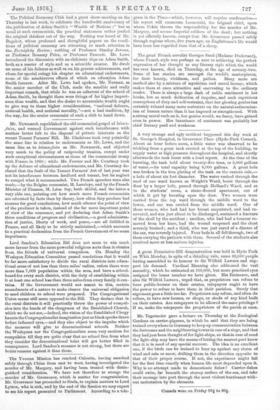Lord Sandon's Education Bill does not seem to win much
more favour from the more powerful religious sects than it obtains from the friends of universal compulson. On Monday the Wesleyan Education Committee passed resolutions that it would be far more satisfactory to divide the rural districts into educa- tional areas of not less than three miles' radius, unless there were more than 7,000 population within. the area, and have a school. boardfox every such district, with the duty of establiahing within it at least one school less than three miles from every family it con- tains. If the Government would not assent to this, certain amendments of a nature to make clearer the universal obligation to send children to school were proposed. The Congregational Union seems still more opposed to the Bill. They declare that in the rural districts it will practically throw the power of compul- sion into the hands of the clergymen of the Established Church, which we do not see,—indeed, the vision of the Established Clergy haunts the Congregationalist imagination just as black specks dance before inflamed eyes,—and they also object to the impulse which the measure will give to denominational schools. Neither the Wesleyans nor the Congregationalists seem very anxious for compulsion till they are quite clear that no school free from what they consider the denominational taint will get better filled in consequence. Lord Sandon's measure is not strong, but there are better reasons against it than these.






























 Previous page
Previous page